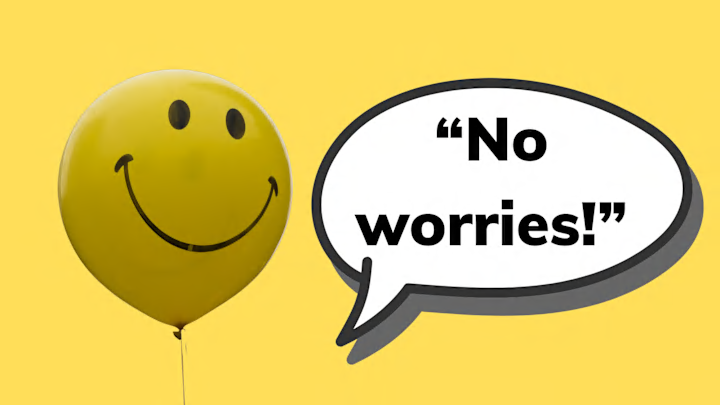You’ve probably heard or said “no worries” before, but did you know it’s a relatively recent phrase? Its meaning that you shouldn’t stress about something didn’t come into use globally until the ‘90s. Before that, you would have to go to the land down under to hear “no worries” used regularly.
Depending on what generation you’re from, you might use “no worries” often—or you might think of it as an impolite response. Older generations, like Boomers and some Gen X, don’t typically understand why anyone would say “no worries” when you could say “you’re welcome” or “that’s okay.” But that’s just because these generations didn’t have the phrase in their lexicon. In the United States, you’ve got to be a ‘90s kid or younger to appreciate the mellow and laid-back response.

What Does it Mean?
The Oxford English Dictionary defines “no worries” as another way of saying “relax” or "no problem.” With the “relax” definition, it’s less of an actual command than it is a suggestion. “No worries” doesn’t mean you’re telling someone that they aren’t allowed to worry. It’s not the same as “positive vibes only,” either. It is more to be used as a phrase to comfort someone else. Saying “no worries” tells the other person that things will work out, and they don’t need to stress about the topic at hand.
The other definition linking “no worries” with “no problem” is the one that older generations tend to hear as disrespectful. It’s a response to gratitude. “No worries” in this context means that the person you’re addressing shouldn’t worry about thanking you. You’re basically saying that whatever action you did was not a burden to you, so the other person doesn’t need to worry about being in your debt. It has simply become a way of saying “you’re welcome” or “my pleasure.”
You May Also Like:
Add Mental Floss as a preferred news source!

Aussie Origins
In the Oxford English Dictionary’s entry for “no worries,” it lists the first time the phrase was recorded in use. In the 1960s, Australia was the original and exclusive country to use the phrase. It fit their lifestyle and was a trending phrase among the Australian hippies, specifically. But, as with much of language, "no worries" began to go global when Australian pop culture spread.
In the 1990s, Australian movies and actors became a huge hit. Crocodile Dundee was released in 1986, and its popularity continued for years. Mick (Paul Hogan) says “no worries” in the film, and people wanting to imitate the character followed suit. Steve Irwin also influenced the “no worries” craze in his series Crocodile Hunter, showcasing his energetic but relaxed attitude.

The ‘90s to Today
In 1994, Disney sealed the fate of “no worries” with their song “Hakuna Matata” for The Lion King. In Swahili, “hakuna matata” translates to “no troubles,” and it is used just as Timon (Nathan Lane) and Pumbaa (Ernie Sabella) say: “it's our problem-free philosophy.” After the success of The Lion King, “no worries” and the philosophy of not stressing over life became a lasting part of the U.S. culture.
While Boomers may not like “no worries,” the fact is that it has become part of our language and is considered polite by the generations that grew up with it. Because if kind people like Steve Irwin said it, then how could it be offensive?
It’s fun to see how pop culture affects so much of our lives, and to see how language adapts to fit with it. Australia might have originated “no worries,” but it has grown to be a phrase known throughout the world, and it will continue for as long as people want to express the idea of de-stressing and going with the flow.
